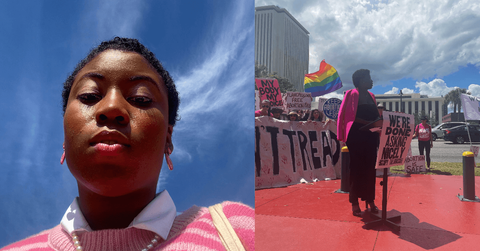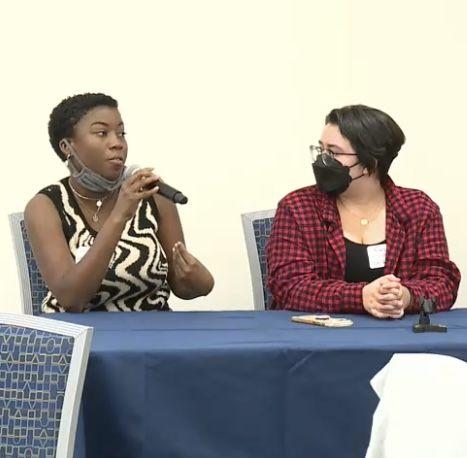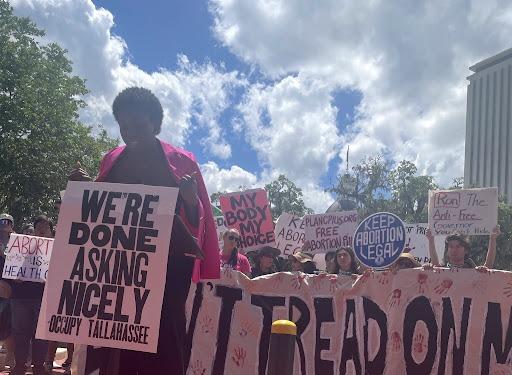Not Ashamed: How My Abortion Impacted My Life

Even as a young reproductive justice activist and public supporter of abortion, Trenece Robertson had never unpacked the years of discomfort she felt since her abortion as a student. She never understood why she felt such shame, guilt, and embarrassment, why she had been terrified to tell her family, and why she felt like a bad person.
Last year, she sat in an audience of young organizers like herself, preparing to protest and fight anti-reproductive rights policies sweeping the country. It was weeks before the U.S. Supreme Court would overturn the 1973 Roe v. Wade decision that granted Americans federal abortion rights. The program organizers gave a presentation on abortion stigma. For Robertson, it was an “ah-ha moment.” That day marked the first time she realized she hadn’t done anything wrong. “So I just told my story for the first time, and I haven’t shut up about it ever since,” she says.
Abortion is a normal and essential part of sexual and reproductive health care. But the culture of shame and silence that targets abortion causes stigma. Roberston is not alone. Stigma means not everyone feels confident about their decision to get the care they need — or comfortable sharing their experiences. By talking with friends and loved ones, we can change the narrative.
Robertson’s success as an engaging storyteller boils down to her main objective: keeping it real.

This summer marks one year since the Supreme Court handed states the power to ban abortion and stripped tens of millions of people of the right to make their personal medical decisions. This left patients desperate, confused, and fearful; and forced doctors to ignore medical guidelines to obey abortion bans, putting people’s health at risk. In state after state, abortion stigma, including misinformation and propaganda, has fanned the flames of abortion bans and restrictions. So Robertson recently spoke with Her Agenda about the campaign of shame around abortion, common misconceptions she’s faced as an abortion advocate, and the lasting power of telling your story.

Her Agenda: What motivated you to start sharing your abortion story?
Trenece Robertson: I really got more involved in reproductive justice activism after the 15-week abortion ban passed in Florida [in August 2022]. I was attending Florida Agricultural and Mechanical University — it’s one of the HBCUs here in Florida — and they have a program called Generation Action, which is Planned Parenthood’s collegiate-level work. I became vice president, and then later got a fellowship in the Black Organizing Program. I started telling my story because I had gotten fed up with people having their weird assumptions about abortion and not getting all the facts right.
Her Agenda: What are the most common examples of abortion stigma that you’ve experienced?
Trenece Robertson: That abortion is a tragedy instead of just a neutral thing. For some other people, it is a tragedy. And for some others, it’s like, “Yay! I was able to choose and take care of myself.” But there’s an assumption that it’s always the former. That’s why I was terrified to tell my family about my abortion. I eventually told them, thank God, but that was one of my biggest anxieties. [Editor’s note: Studies have shown 10 years after having an abortion, 95% of women still feel confident they made the right decision.]
Her Agenda: How do people typically react when you talk about your own abortion?
Trenece Robertson: Overall, most of the people I come across are rarely hostile. The responses are usually “Thank you” or “Wow, I’ve never heard anyone tell a story like that before.” I’ve had an older community member tell me, “I saw you on the news and appreciate you telling your story because I’ve never seen a Black woman say that before.” So when it comes down to it, most people do mean well.
Her Agenda: What advice and insight would you give to people looking to tell their own abortion stories?
Trenece Robertson: Consider showing a scar and not an open wound. If you just had an abortion and you still haven’t fully processed that, you might not want to talk publicly about a fresh trauma, especially if you’re talking about something as — I hate to say it — controversial as abortion. So give yourself space, heal a little bit, and once you are ready and your wound has [healed], you can go out and about and do your thing.
Another important takeaway that I’ve learned is that if I don’t tell my story, someone else will. You don’t need to have gotten an abortion to have an abortion story. It could be about how you escorted one of your friends to an abortion clinic. It could be sharing your experience about sex education and how that affected you. Anyone could be a reproductive storyteller, anyone.
For information and resources on ending abortion stigma, visit plannedparenthood.org/EndStigma. This article is sponsored by Planned Parenthood.





